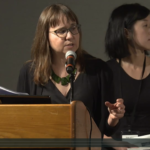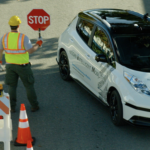
MARKUS ROTHMÜLLER
School of Architecture, Design and Planning, Aalborg University Copenhagen, Denmark and Shift Insights & Innovation Consulting
PERNILLE HOLM RASMUSSEN
School of Architecture, Design and Planning, Aalborg University Copenhagen, Denmark
SIGNE ALEXANDRA VENDELBO-LARSEN
School of Architecture, Design and Planning, Aalborg University Copenhagen, Denmark
[s2If is_user_logged_in()]
Download PDF
[/s2If]
[s2If current_user_can(access_s2member_level1)]
[/s2If]
Case Study—This case study presents ethnographic work in the midst of two fields of technological innovation: automated vehicles (AV) and virtual reality (VR). It showcases the work of three MSc. Techno-Anthropology students and their collaboration with the EU H2020 project ‘interACT’, sharing the goal to develop external human-machine interfaces (e-HMI) for AVs to cooperate with human road users in urban traffic in the future. The authors reflect on their collaboration with human factor researchers, data scientists, engineers, experimental researchers,...


